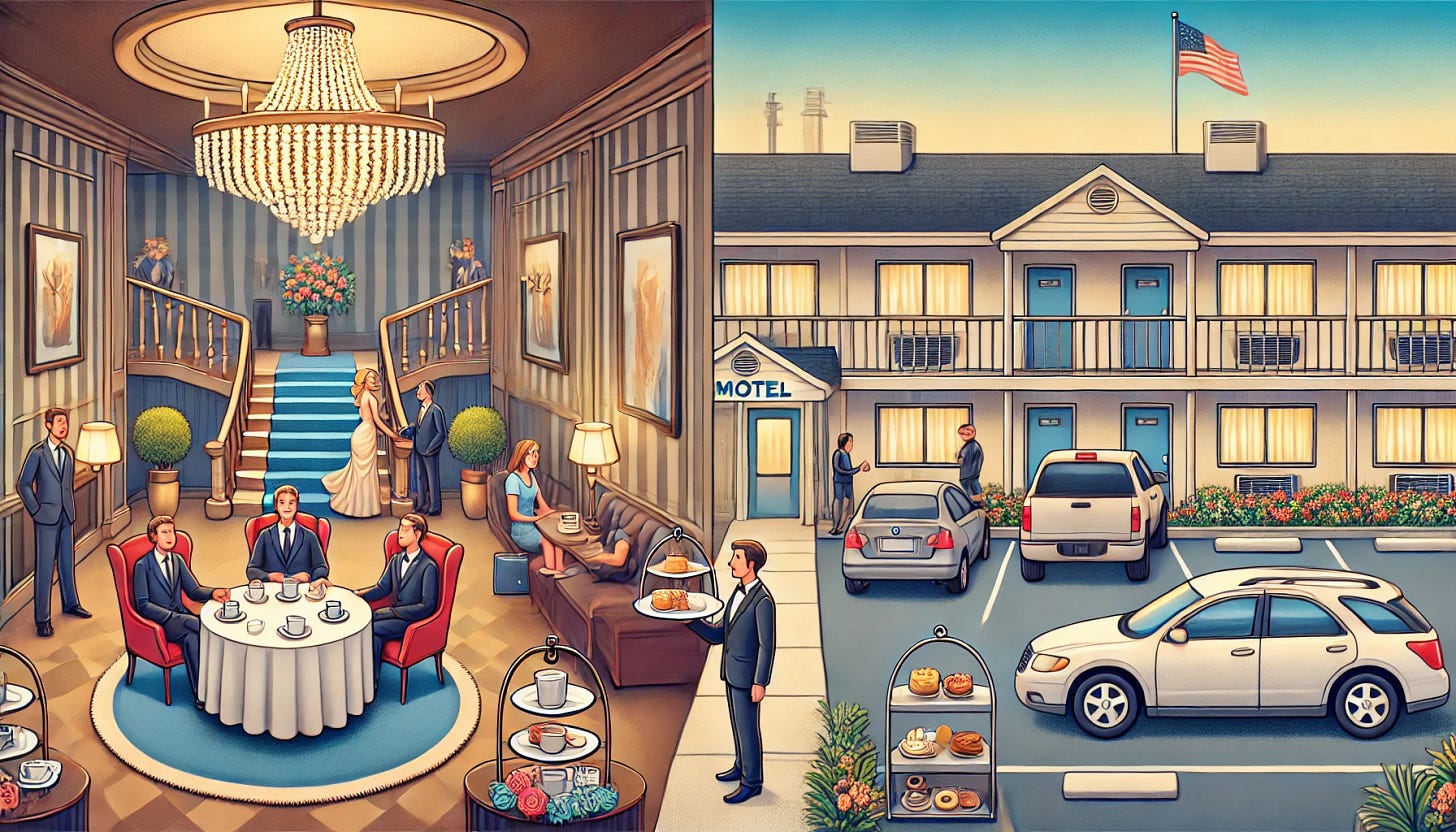Ever stay in a hotel?
Okay, that’s too much of a softball question, even for this early in the morning. Have you ever stayed in a full-service hotel?
If you’re thinking that sounds terribly expensive and cost prohibitive, like flying first class, you’re not totally wrong. However, there’s a bit of nuance here, and I want to share a few of these little observations with you today.
One of my favorite things to do is to find wonder in the mundane—something utterly fascinating within something that seems boring. I think there’s interesting stuff happening all the time, everywhere, and we just need to know how to look at it. It’s tough to imagine the idea of a full-service hotel making the hairs on the back of your neck stand up, but maybe I can at least make one of your eyebrows go up.
Let’s start with the phrase itself. Full-service is usually written with a hyphen, especially whenever it’s used as an adjective. If you offer full service, you would normally skip the hyphen, but if it’s in front of the word hotel, then full-service it is, hyphen and all.
This etymology is important today, because hyphenating a two-word phrase like that can transform its meaning in somewhat unexpected ways. Over enough time, “full-service” doesn’t really have to mean the same exact thing as “full service.”
In fact, that’s exactly what seems to have happened here. When you go to a cheap motel somewhere, you will often see that lots of free things are included. You’re almost certain to get a free continental breakfast, free coffee, free toothpaste in your room, free wi-fi, free everything you might possibly need during this stay (within reason).
You’re staring at those words and thinking, um, those are services. Why on earth shouldn’t that sort of hotel be classified as a full-service hotel? By contrast, the hotels we actually call full-service actually include… well, pretty much none of those optional amenities.
That’s where that sneaky hyphen comes in and allows a lot of linguistic freedom, but that’s really just for starters.
Now, I’ve stayed in a lot of these types of not-full-service hotels. Pretty much any time I traveled from the 1990s through the late 2000s—and I did a lot of traveling—I stayed in one of these limited-service hotels. Sometimes, these places would be called budget hotels, which makes a ton of sense.
I know full well what that continental breakfast at a budget hotel is likely to include, and I’m well aware of what the in-room coffee is going to taste like. If your mouth is puckering just thinking about this flavor, you’ve probably stayed in a lot of these types of rooms too.
Suffice it to say, the quality of most of the other free giveaways wasn’t usually the focus. Instead, this was about providing value to the cost-conscious traveler, and they did a bang-up job at that. If I could eat a big enough breakfast, even if it tasted like it was made of sawdust and salt, that was one less meal I needed to worry about that day.
From my perspective as a starving artist, traveling everywhere and trying to pay my rent back home (or just trying to survive, given the time frame), these types of hotels were a true beacon for the wary traveler. The free coffee wasn’t any better than the breakfast, but it meant that I didn’t need to buy coffee that morning.
In other words, I was able to take advantage of more than just the night’s stay. It was included in the very low price.
Incidentally, it might be interesting to talk about these prices: most of the rooms I stayed in circa 2005 were around $50 or so, but during the 90s, I could reliably find rooms with two beds for as little as $29.99 while traveling down I-95. I even found a room for $19.99 for the night once, and that’s the cheapest night I’ve ever stayed somewhere (my share was $10). What about you—any notably cheap hotel stays?
If my stay in these hotels was a godsend, imagine how amazing it must have been for wary travelers during the ancient world or during the middle ages. I had the luxury of beating up the highway with my 84 Ford Escort, but merchants, refugees, and pilgrims during those times might have been hanging onto life by a thread, finally finding a place of refuge for a night or two, along with some food and drink.
The world became much smaller during the 19th century, and luxury hotels catering to more wealthy travelers became more common. Meanwhile, the idea of a hotel for a budget-conscious traveler grew in parallel with the luxury side of the business.
I pointed out driving in my car to get from place to place, and that’s how most people in the US got from place to place for most of the 20th century. It makes sense, then, that the motor hotel (motel) should crop up here. Now, instead of walking through a hotel’s entrance, up a stairway or elevator and down a corridor, you would just drive right up to the room’s front door (after checking in at the very minimalistic front desk).
Motels dominated the affordable hotel landscape by the time I was driving around everywhere. Meanwhile, the full-service side became more differentiated, seeking to offer people more choice in their amenities, and a potentially much higher quality, too.
If you stay at a motel, you’ll get a bar of soap that’s technically soap. Likewise, the coffee technically qualifies as coffee. By contrast, if you stay at a full-service hotel, you might be able to purchase some good coffee at the coffee bar downstairs, or have a decent breakfast brought up to your room (for a fee, of course). You might even be able to have a private chef come up to your room to cook for you, or have a concierge book a walking tour of a nearby landmark, for instance.
It always used to crack me up whenever I ended up staying in one of these types of hotels. I always felt as though I didn’t belong—walking inside and through a corridor felt very formal as compared to just walking right up to your door, as with motels, and the base price was generally cost-prohibitive for young Andrew.
Mainly, though, I would chuckle at the terminology.
There are two ways to look at this divergence in types of places to stay. On the one hand, the full-service hotels seem to cater to the wealthy, while the limited-service motels and inns cater to budget-conscious folks. This can be viewed as dangerous classism, dividing the poor from the rich and creating division.
On the other hand, budget hotels are awesome for folks on a budget. The trade-off between having crap coffee and a mushy “bagel” is worth it for you, since you get to save a significant amount of money, which you can use for other things.
If there’s one thing I know about road trips, it’s that they can be memorable. Have you built any memories of staying in cheap (or luxurious) hotels during any road trips you’d like to share today? Given the choice today, would you prefer to get the included coffee and breakfast, or pay separately for the specific things you want?
There’s no wrong answer here, but tell me why you drew that conclusion, and we’ll go from there in the comments.







The best-known "full service" hotels in Canada were built before World War II and are swanky, multi-story affairs meant for wealthy passengers travelling by the railroads (they include the Chateau Frontenac in Quebec City, the Chateau Laurie in Ottawa, the Empress in Victoria and the Fort Garry here in Winnipeg). In contrast, our budget hotels tend to be franchises of large American companies like Super 8, Days Inn, Motel 6 and Best Western.
I'm just gonna leave this here: https://www.youtube.com/watch?v=st21dIMaGMs